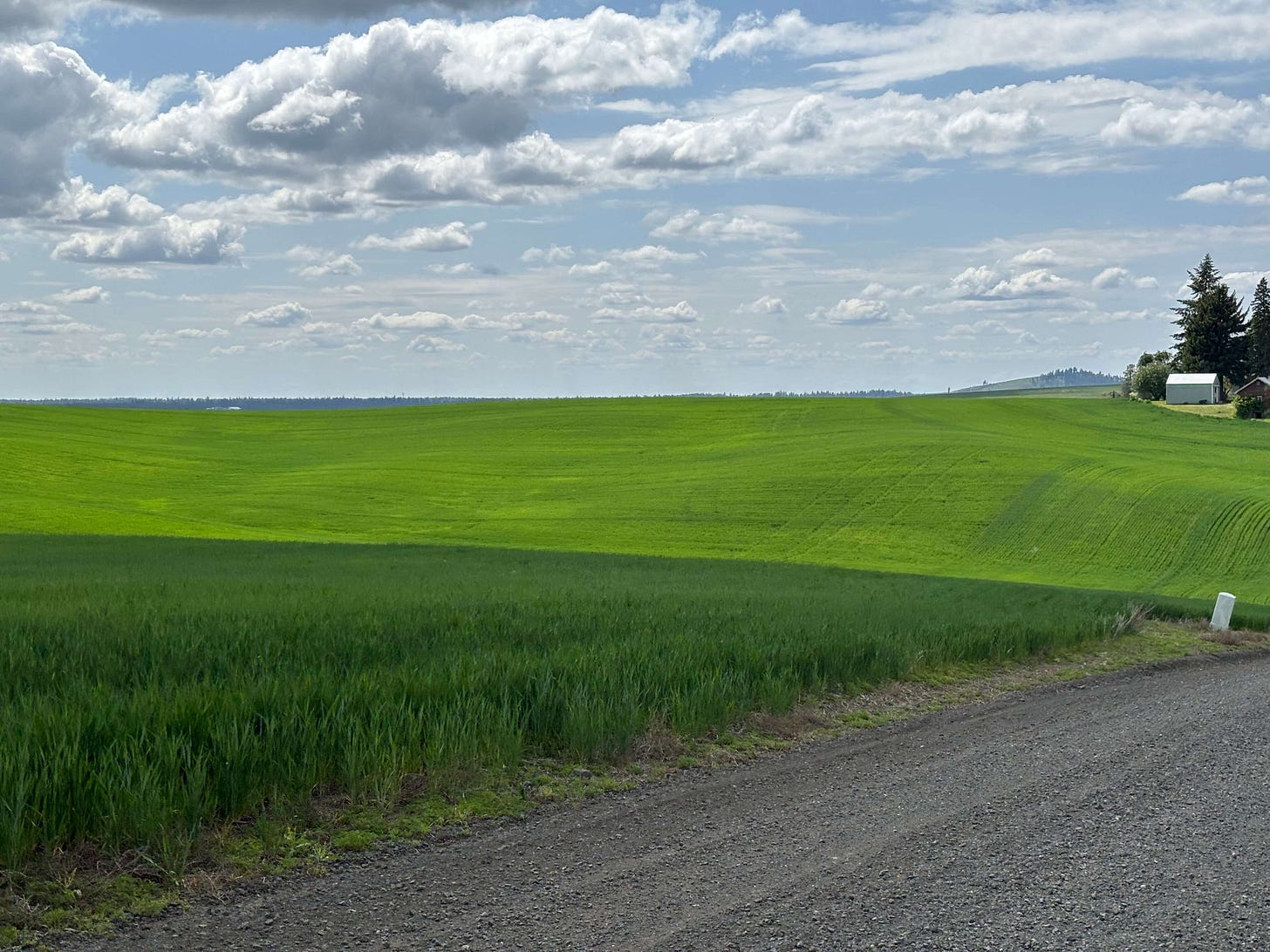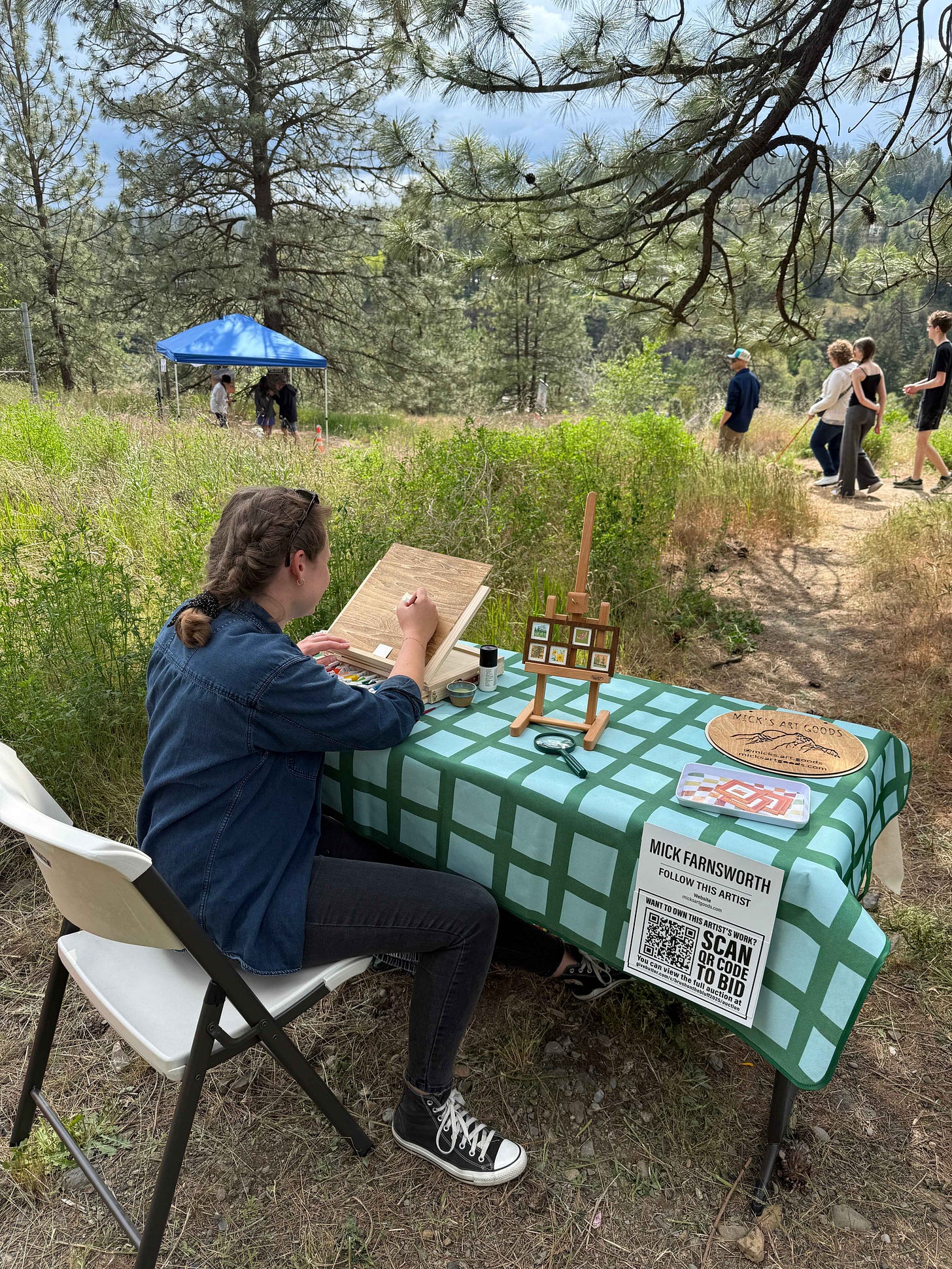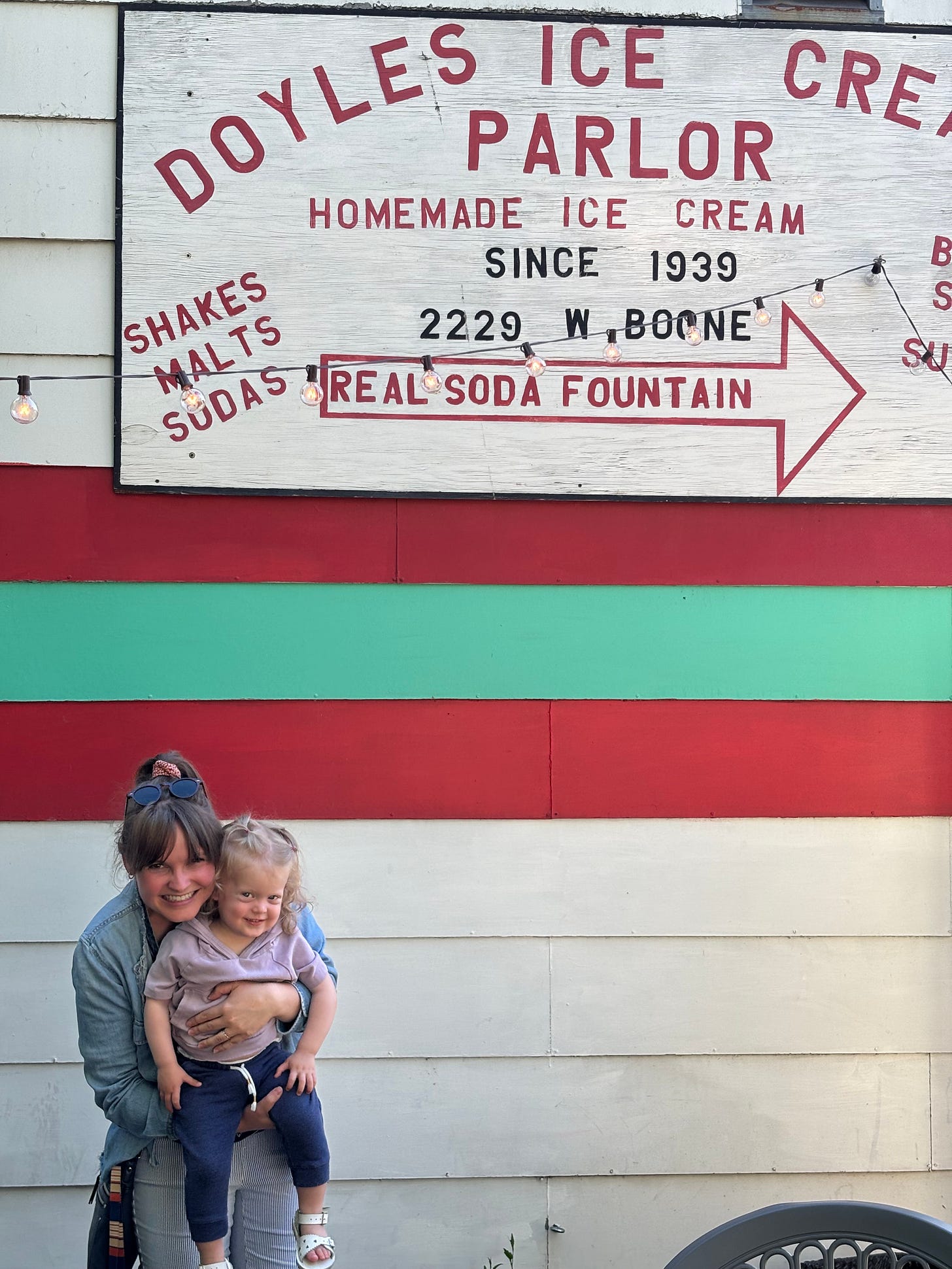You’re reading From the Desk, a monthly newsletter from Miles Farnsworth about the arts, spirituality, and living the good life. Scroll to the bottom to see Recs from the Desk and 5 Photos from the Last Month.
Back in February, I wrote that turning 30 is akin to reaching the top of a plateau. All the milestones of life—graduations, marriage, jobs, kids—represented a steady climb. But now, the vista is flat; fewer peaks appear in the immediate future. You could say this is true of adulthood in general, not just turning 30. The escalator of adolescence carries you upward rather effortlessly until one day it stops, and any further climbing is up to you.
In short, personal growth is not guaranteed, nor is it an event. Life doesn’t require growth, at least not continual growth. It’s possible to drift by either aimlessly or resting on past laurels.
Since the rest of this newsletter strikes a less personal tone, allow me to be vulnerable at the top and admit that I’ve struggled to recognize meaningful personal growth lately. My focus at work has shifted slightly, and I find myself going through the motions at times. With the kids, life can sometimes become monotonous, with the cycle of meals, bath time, going to the playground, and sleep routines being equally tiring and mundane. I’m attempting to write more fiction, but can manage 400-500 words a week at most, the crawling pace a product of both my ineptitude and available time. In short, things are looking a little too much like Groundhog Day.
Yet I know that life tastes sweeter when I grow.
So, how is growth obtained? If you were to boil personal growth down to its most fundamental formula, you’d get something like this: Growth = Experience x Knowledge.
While this formula describes what amounts to growth, it doesn’t quite capture how to put experience and knowledge to work to propel us closer to our best selves. Something must catalyze us to action.
Intentionality is the first step to growth. It means, simply, to do something and to have a reason for it. Intentionality can lead us to new experiences, put us out of our comfort zone, and push us to explore the world around us. It can lead us to seek greater knowledge, to study, learn, and practice.
The second, higher catalyst, self-awareness, has the transformative power to turn our experience and knowledge into growth. It forces the experience and knowledge into conversation with each other, resulting in wisdom.
Intentionality and self-awareness are thresholds we must cross to recognize growth. If we feel stuck, it’s probably because we’re living beneath one of these thresholds.
As represented on this graph, there are four types of people: Drifters, Dreamers, Tourists, and Growers.
Before we dive into each one, it’s important to note that this is not a static chart. All of us shift constantly, and perhaps even find ourselves spread across multiple groups depending on which facet of life we isolate, be it work, family relationships, spirituality, or even our hobbies.
The Drifters:
To be a Drifter is not any worse than being a Dreamer or a Tourist. It only means there are two thresholds to cross before achieving growth.
Drifters manifest in a few different ways but are always defined by their lack of intentionality. These people could be lost, unsure how to even begin moving forward, and thus floundering in inconsequence, much like the high school senior who doesn’t move out or get a job.
Drifters can also be those floating comfortably through life. Perhaps at one point, they did gain valuable experience, knowledge, and ultimately grew before giving in to apathy. Now, they’re stuck in their routines, never experiencing anything new or pondering why they should.
The Dreamers
Dreamers, unlike Drifters, are thinkers. Having crossed the threshold of intentionality, they actively pursue learning new things. You might call them booksmart. However, as they sit on the lesser side of experience, their knowledge only goes so far and rarely translates into growth. These are the kind of people who Paul tells Timothy in the New Testament are “Always learning and never coming to a knowledge of the truth.” They risk becoming too philosophical and theoretical. They’ve read all the latest self-help books but still can’t get their act together.
Dreamers are also those people who always have a great idea but never find a way to execute. They like the imagined glory of their aspirations but have an excuse as to why they haven’t begun to achieve. Again, this is an experience problem, but it’s also a self-awareness problem. They have not understood what exactly is holding them back, whether it’s a fear of failure, a correct appraisal of their abilities, or the need for stronger determination.
The Tourists
The name “Tourists” is inspired by Ron Swanson’s quote on Parks and Rec S2 E16 when he tells Leslie of her boyfriend: "He’s a tourist. He vacations in people’s lives, takes pictures, puts them in his scrapbook, and moves on. All he’s interested in are stories.”
Tourists, like dreamers, have crossed the threshold of intentionality, focusing on experiences rather than knowledge. In many ways, tourists are fun. They’re game to try new things and always have their hands in something new. The tourists’ tragedy is that experience never ascends to growth because they’re uninterested or unwilling to reflect and ponder on their experiences. Novelty, rather than growth, becomes the primary goal, and as such, tourists are recognizable for a certain shallowness, even a selfishness.
While tourists can be fun, they also can exhibit behaviors that make them difficult to live with, especially when their life experiences aren’t all sunshine and roses. Tourists often fail to learn from past mistakes, repeatedly smashing headfirst into frustrations without changing course. They may fail to take personal responsibility and can end up jaded and cynical, distrusting of life and others. They have trouble committing, and when things get serious or tough, they walk away, doing so in the name of “self-preservation”.
Two Misconceptions of Experience
Before describing Growers, a few words must be said about the pursuit of meaningful experience, specifically misconceptions to correct. One is to assume that growing accustomed to your circumstances is the same thing as growth. It’s not. I would call this callousness. Callousness may have its own merits. Sometimes all you can do is grin and bear it, hoping that it won’t hurt so bad the upteenth time. Yet this is not growth.
Another is to assume growth will always arise from quality experiences. This is not necessarily true. While some life choices like marriage, having kids, a big move, or a difficult job have the potential for rapid and meaningful growth, they certainly aren’t guarantors of growth.
For example, you’ll often hear that raising kids develops patience. Well, it can. Or it can’t. You will be placed in situations that try your patience; that is true. However, sometimes you’ll stoop to the level of your child rather than showing restraint and kindness. Without increasing your knowledge, aka, finding strategies to remain calm, learning how to communicate better, knowing when to remove yourself from a situation, etc, you’ll fail to improve the situation.
The Growers
Growers are the only group who have passed the threshold of self-awareness. And that self-awareness informs the experiences and knowledge they seek. Growers intentionally seek out valuable experience. They know that sometimes life requires short-term discomfort for long-term satisfaction. They are prone to reflection and seek out good counsel and feedback for their blind spots. They strive to understand the world around them. Ultimately, Growers harmonize their knowledge and experience to produce growth.
What do Growers look like? How do they behave? While not necessarily Stoic, they ride the pits and peaks of life with greater calm. They are forgiving of others’ shortcomings. They are disciplined in their habits. They have a gracefulness, an elegance in the way they carry themselves.
Growth and Joy
I’m reminded of the quote by Russel M. Nelson: “The joy we feel has little to do with the circumstances of our lives and everything to do with the focus of our lives.” The same could be said of growth.
We would be mistaken to think that growth is always measured by success or a progression on a pre-determined ladder. Growth can be about stepping back, reevaluating, developing peace, and finding joy.
Though my current life may have very strict routines, growth can look like giving of myself more fully to my responsibilities, to being present and engaged, to finding joy in the daily repetition of work, kids, and other responsibilities. And in this, there is joy.
Something to Decorate With: How to Look Rich. If only Spokane had an IKEA.
Something to Help You Find Your Next Read: This website scraped all the data from Goodreads, creating a much better filtering mechanism for finding new books. My suggestion: Pick a genre, 5,000-10,000 reviews, 4.15 stars or more. Should pull up some lesser-known gems.
Something to Challenge Your Map Skills: This game is so flippin’ hard. Try and guess the city as the map zooms out. Also available in a USA cities version.












"They’ve read all the latest self-help books but still can’t get their act together."
Life post 30 also feels so prescriptive. Maybe it's due to the plateau, everyone thinks they have the best Post-30 plan for you. It feels like self help books are aimed squarely at this market; knowing the vulnerability of a foggy road ahead.
I continually have the thought of, no one is coming to save me anymore. I am in the thick of it and whether I am a dreamer, drifter, grower or a tourist is 100% up to me. It's a weird double edge sword. Call that a Catch-22(+8)